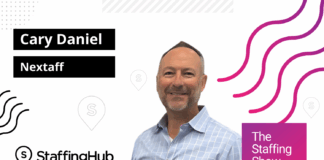
By Klarissa Fitzpatrick, Content Marketer at Ringover
Key Takeaways:
- Technology integration: AI, remote interviewing tools, and blockchain are transforming staffing processes by improving candidate selection, streamlining recruitment, and enhancing verification methods.
- Shifting workforce demographics: The rise of remote work, flexible arrangements, and the growing gig economy are reshaping staffing firms’ offerings, with Generation Z driving a focus on work-life balance and skills-based hiring.
- Economic and regulatory challenges: Staffing agencies must navigate global economic uncertainties and evolving regulatory requirements, necessitating adaptability to sector-specific growth, labor laws, and data protection standards.
As the year 2025 draws near, the staffing industry stands on the brink of transformative changes. These shifts are propelled by advancements in technology, changes in workforce demographics, and evolving market dynamics. Staffing agencies and companies alike are preparing to steer through these changes, aiming to attract the best talent, improve the candidate experience, and adjust to the changing work environment.
The need for highly skilled workers, especially in areas such as IT and software development, is on the rise. However, the availability of qualified candidates is not keeping up. Industry experts predict that the global staffing market will grow by approximately 6% each year, with the United States leading in terms of revenue and expansion. Yet, this growth does not come without its hurdles, including shortages of talent, fiercer competition for highly skilled professionals, and the necessity for more innovative recruitment strategies.
This article will explore the major trends and challenges facing the staffing industry in 2025, providing insights into how the sector is expected to evolve.
Emerging technology in staffing
Integration of artificial intelligence
Artificial Intelligence (AI) is transforming the staffing industry by enabling the analysis of extensive data sets to pinpoint ideal candidates for job vacancies. This advancement simplifies the candidate evaluation process, significantly cutting down on the time required for manual screening and improving the precision of candidate selection.
AI’s capabilities include condensing resumes, generating concise candidate profiles, and devising interview queries tailored to specific job roles, thus streamlining and objectifying the recruitment process. Moreover, AI tools offer recruiters personalized performance insights, empowering them to improve their approach rapidly.
Rise of remote interviewing tools
The trend towards remote work has hastened the integration of remote interviewing technologies within the staffing sector. These innovations allow recruiters to execute interviews and evaluations from any location, maintaining the continuity of the hiring cycle regardless of geographical barriers. Additionally, the exploration of virtual and augmented reality for recruitment events and onboarding introduces candidates to engaging, lifelike experiences that mirror actual job settings.
For instance, organizations have initiated virtual career fairs, where participants can engage through VR headsets and avatars, rendering the recruitment experience more interactive and widely accessible.
Blockchain for verification
Blockchain is poised to revolutionize the staffing field by offering a secure, transparent framework for the verification of candidate qualifications and references. This innovation reduces the incidence of credential exaggeration, streamlining the recruitment process. Blockchain’s ability to authenticate credentials instantaneously enables staffing firms and employers to make well-informed hiring decisions, minimizing the risk of employing individuals with inaccurate information.
Shifts in workforce demographics and expectations
Increasing demand for flexible work arrangements
The COVID-19 pandemic has significantly changed how we work, leading to a high demand for flexible work arrangements. Remote and hybrid work models are now the standard, with many employees wanting the flexibility to work from anywhere.
This change is especially noticeable in the staffing industry because global digital jobs are expected to rise approximately 25% by 2030. As a response, staffing firms are incorporating remote interviewing tools and virtual onboarding processes to ensure that candidates can smoothly transition into new roles without needing to be physically present.
The gig economy’s continued expansion
The gig economy is expanding, with an increasing number of workers choosing temporary, contract, or freelance roles. This trend is evident in the staffing industry, where there has been a significant increase in independent workers in the United States.
By 2023, there were approximately 36.6 million occasional independent workers, a sharp rise from 15.8 million in 2020. This move towards gig work is fueled by a desire for flexibility and autonomy, as well as the necessity for workers to bridge gaps between traditional jobs.
Staffing agencies are adapting by offering more flexible and diverse employment opportunities to meet the changing preferences of the modern workforce.
Generation Z’s influence
Generation Z, born between 1997 and 2012, is making its mark on the workforce, bringing new expectations and values. This generation values work-life balance and diversity, equity, and inclusion, and is the most tech-savvy yet.
In response, staffing firms are prioritizing a positive candidate experience, using technology to make the hiring process more efficient, and focusing on company culture and values that resonate with Gen Z’s expectations. For example, skills-based hiring and upskilling/reskilling programs are gaining traction to attract and retain top talent from this demographic.
Economic factors and market dynamics
Global economic uncertainties
Global economic uncertainties significantly influence the staffing industry, driving trends and posing challenges. Various factors, including government policies, international transactions, and market speculations, can either destabilize or stabilize the market. For example, central banks altering interest rates can affect investment flows into the staffing sector and others.
A rise in interest rates might decelerate economic growth, leading to a decreased demand for both temporary and permanent staffing services. On the flip side, lower interest rates might boost economic growth, resulting in heightened hiring activities across numerous industries. Moreover, geopolitical events and trade policies can sway the global economy, thereby influencing the staffing market’s performance and growth opportunities.
Industry-specific growth variability
The staffing industry faces growth variability across different sectors. Industries like healthcare and technology are witnessing rapid expansion and a high demand for skilled personnel. In contrast, others may experience slower growth or decline.
This growth variability significantly affects staffing firms, necessitating adaptive strategies to meet each sector’s unique demands. For instance, healthcare staffing agencies are in higher demand due to an aging population and the need for specialized healthcare professionals. Meanwhile, sectors such as manufacturing might see slower growth due to automation and economic shifts. Staffing firms must therefore remain agile and responsive to the ever-changing market conditions.
Regulatory changes and compliance
Staffing firms must navigate through regulatory changes and compliance requirements, which play a critical role in their operations. Government regulations on labor laws, tax policies, and data protection laws can have a profound impact on staffing agencies.
Changes in labor laws concerning temporary workers, minimum wage, or benefits can alter staffing firms’ cost structures and operational efficiency. Furthermore, regulatory shifts in data protection, like the GDPR in Europe, mandate staffing agencies to manage candidate data securely and in accordance with the law.
Failure to comply can lead to hefty fines and damage to reputation, underscoring the importance for staffing firms to stay abreast of regulatory changes and ensure compliance.
Conclusion
Looking forward to 2025, the staffing industry is on the cusp of a major evolution. The introduction of cutting-edge technologies such as AI and blockchain is set to revolutionize the way recruitment is conducted. At the same time, changing workforce demographics and a shift in expectations are pushing for more flexible work arrangements and a focus on skills-based hiring.
The landscape of the industry is also being shaped by economic uncertainties and regulatory changes. For staffing firms to succeed, adapting to these trends, prioritizing the candidate experience, and harnessing technology to improve their offerings are essential steps.
By remaining adaptable and responsive to these shifts, staffing firms can not only attract the best talent but also stimulate growth and secure a competitive advantage in the rapidly changing staffing market.
 Klarissa Fitzpatrick is an Content Marketer at Ringover. She’s passionate about creating actionable and engaging content that helps professionals get the most out of their workdays. A lifelong writer, she has extensive experience in creative and journalistic writing and is now dedicating herself to mastering B2B content marketing.
Klarissa Fitzpatrick is an Content Marketer at Ringover. She’s passionate about creating actionable and engaging content that helps professionals get the most out of their workdays. A lifelong writer, she has extensive experience in creative and journalistic writing and is now dedicating herself to mastering B2B content marketing.





